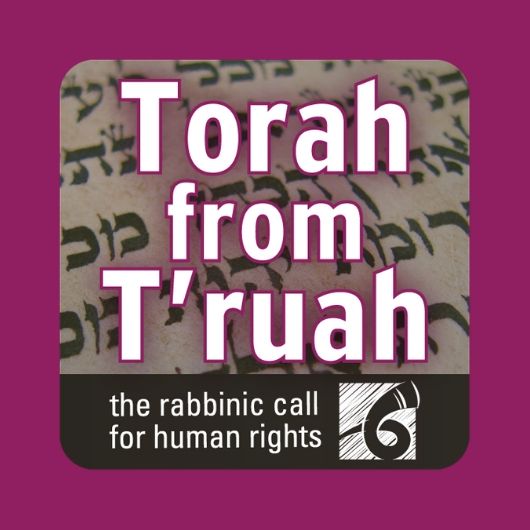Commentary on Parshat Chukat (Numbers 19:1 – 22:1)
They gathered. Hundreds of thousands of them around a hole in the dank, dark earth. They watched Moses, tears streaming from his eyes, as he eulogized Miriam. The community was then without water, and they joined against Moses, saying, “Why have you brought God’s congregation into this wilderness for us to die? Why did you make us leave Egypt to bring us to this wretched place? There is not even water to drink.” Moses, in his anguish moved away from the angry throng, seeking God. God said: “Take the rod and assemble the community, and before their very eyes order the rock to yield its water. Thus you shall produce water for them.”
Moses took the rod in his hand, but rather than speak to the rock, Moses raised his voice against the people in anger: “Listen you rebels, shall we get water for you out of this rock?” And he raised his fist with the rod, striking the rock with all of his might. The rock shattered into water and the people drank, but Moses was castigated by God for his anger, punished with the promise of not entering the land.
Sign up to receive Torah from T’ruah in your inbox each week.
A bit disproportionate, no? What has he done to deserve such a harsh sentence? He just led the people from slavery to freedom! He just suffered the loss of his sister! How can one moment of primal anger erase 40 years of leadership?
The commentators explain that God punishes Moses for his misdirected anger. Instead of recognizing his own suffering at the loss of his sister, and exasperation at the complaining people, Moses raises his hand in rage. He insults the people, calling them rebels and shatters the rock by force.
Moses reacts viscerally to the people, with the rage of a child. Both he and his people are paralyzed by his actions.
And that is the danger of anger. It has the potential to completely consume us. It can deter us from what we want to accomplish most in our lives. The mystical book, the Zohar, goes so far as to teach us that when a person smashes an object in anger, the pieces of the object represent a sacrifice on Satan’s altar.
And what does this mean for us? Does it mean that if we strike the steering wheel in frustration while stuck in traffic then we are eternally doomed to hell? Or is it teaching us that if we yell at our children after a difficult day of work, we are then deprived of wisdom and vision? We get angry. Sometimes we look in the mirror and see Moses reflected, raising a staff against those we love. There is a lot in our world to make us angry. From the personal pains to the communal pressures of homelessness, hunger, the objectification of immigrants; political rancor of the sort most of us have never experienced in life, acute hatred and bigotry; so much of it perpetrated by our leaders themselves. We live in a world in which we increasingly don’t feel heard or seen or understood. For sure, we have reason to be angry….to yearn to lash out….to shatter the rock and scream in pain.
The problem is that in our anger, like Moses, we are losing faith in ourselves and the hope that we can actually still make life better. Our anger clouds our ability to see forward. It makes us feel good in the moment, in what becomes righteous indignation and protest…and indeed, we should stand with a backbone for what is right and good and just in the world. But we should bend with the arc of justice, not with the arc of anger that simply disguises our own pent-up frustrations about ourselves and the world.
Find more commentaries on Parshat Chukat
How we choose to deal with the anger can affect the change for which we are yearning. We can role model for our lost role models, not buying into the insidious game to which they are goading us. Anger can control us through violent word or action…or we can control it.
Our tradition compellingly calls on us not to excise our anger as some alien growth, but rather to discover the holy spark within it. It begs us not to reject our anger, but acknowledge it as a part of our very being. By acknowledging, understanding and communicating with ourselves and others, we might be able to raise and redeem our feelings of misdirected anger. It’s not the anger that’s wrong…. it’s the misdirection.
Moses looked at the people as they gathered before him. He was weary of being a leader. He wished that the voice of God could be excised from his ear. He wished he could be left alone. But his resentment, exhaustion and pain bubbled from his core and he raised his staff against his people and against God. He lost. He didn’t get to the Promised Land. Everything he wanted most was taken away.
 There is a lot we can learn from our greatest leader’s imperfections. Our world is up for grabs; our souls hang in the balance. How we respond will say everything about the future we can still impact in its forming.
There is a lot we can learn from our greatest leader’s imperfections. Our world is up for grabs; our souls hang in the balance. How we respond will say everything about the future we can still impact in its forming.
Rabbi Matthew D. Gewirtz is the senior rabbi of Congregation B’nai Jeshurun in Short Hills, N.J. He is the president of the Coalition of Religious Leaders of the State of New Jersey and the author of The Gift of Grief: Finding Peace, Transformation, and Renewed Life after Great Sorrow (Random House). He appears as a commentator on religion on MSNBC’s Morning Joe and CNN’s State of the Union, and recently started his own television series as a tri-anchor of PBS’s (NJTV) A Matter of Faith with a Bishop, an Imam, and a Rabbi.

